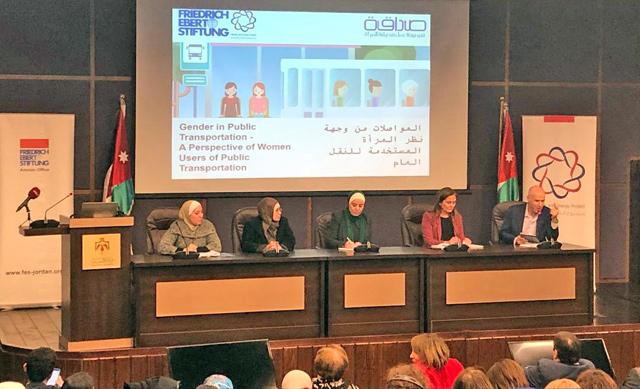You are here
Study finds 47% of Jordanian women have turned down jobs due to lack of viable public transport
By JT - Feb 28,2019 - Last updated at Feb 28,2019

In this undated photo, The Friedrich Ebert Stiftung and SADAQA release their findings on transportation obstacles facing Jordanian women’s participation in the labour market (Photo courtesy of SADAQA)
AMMAN — The Friedrich Ebert Stiftung (FES) and SADAQA, an organisation that promotes women’s economic rights, have recently released the results of a study on transportation obstacles limiting women’s economic opportunities.
The study, released during an event at the Transport Ministry and titled “Gender in Public Transportation: A Perspective of Women Users of Public Transportation”, aimed to shed light on women’s use of public transportation and issues preventing them from using the service, according to a statement sent to The Jordan Times.
Minister of Transport Anmar Khasawneh patronised the launch of the study and said it “is one of the few studies that tackle transportation from a gender perspective... one of its main findings is that if we increase the number of women who access public transport, we will increase women’s economic participation which in turn would contribute positively to both economic and social development”.
Director of FES’ Regional Climate and Energy Project Franziska Wehinger said that the study was the first of its kind conducted in Jordan and took two years to complete.
The study surveyed around 500 women from 11 governorates in Jordan from both a quantitative and qualitative research approach, according to the statement.
It found that 55 per cent of women who use public transportation say that public transport negatively impacts their lives and causes them constant delays in reaching their places of work and study, and has driven them at times to drop out of work or studying all together.
The study also found that 47 per cent of women in Jordan have refused a job offer due to the lack of transportation.
“Too many women are not working because it is purely too expensive or impossible to reach their work place by using public transport. There is a lot of work to be done, and the study is the basis for this work,” Wehinger said.
This study ultimately aims to advise policymakers, civil society, women’s groups and stakeholders in Jordan by providing a gender-focused data when analysing public transport.
Related Articles
Nine out of 10 people own cell phones in Jordan, which ranks third in engagement in social networking sites among Arab states, according to the 2013 Spring Pew Global Attitudes Survey.
AMMAN — Chairman of the Arab Potash Company’s (APC) Board of Directors Shehadeh Abu Hudaib on Saturday indicated that the company’s potash m
AMMAN — Royal Jordanian (RJ) Airlines net operating profit in 2018 was JD6 million higher compared to that of the previous year as it reache















